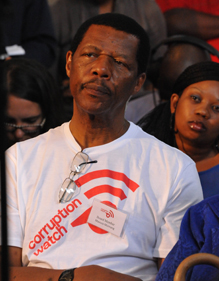
The organisation functions by encouraging the public to report experiences of corruption directly through an “incident report” form on our website, or by sending SMSes, email, post, fax, facebook messages or by calling our landline.
The reports we receive are inputted by staff into our online database to ensure we have one repository of all information received from the public. Each report is read by our team and we acknowledge receipt if we have a way of communication with the person who sent us the report.
We then decide what action to take about each report. We might use the information to write a news story for our website; or we might give it to a journalist who works for another media house to investigate and report the story. We might ask our investigators to investigate the report in more depth. We might file the report with other similar stories to use in future campaigns or research reports.
From time to time we also analyse the reports in our database to get an idea of trends in reporting. It’s important to note that this analysis gives us an overview of the kind of corruption being reported to the organisation – not corruption trends in the country at large.
Since our launch on 26 January 2012 up until the end of August, we have logged 2 350 reports, with the majority of incidents being communicated via SMS and the “incident reporter” page on the Corruption Watch website. The next most common methods of reporting are email, phone, fax and post methods. We have also received a small number of reports via our social media channels and referrals from other civil society organisations like COSATU and Section 27.
Where do most of the reports come from?
Most corruption reported to us so far has taken place in Gauteng, which makes sense as it is a densely populated province and this is where our activities and public campaigns have been based – although we plan on extending our reach in the future. That said, we have also seen a steady flow from Mpumalanga, Free State and Limpopo, which shows that coverage on community radio stations in some of these areas and time on national radio is helping get the word out. At the moment Corruption Watch has a regular weekly slot on Jacaranda and YFM.
84% of the reports we get come from metro municipal areas, with the remainder coming from small towns and provincial capitals.
Types of corruption reported
Since our launch we have recorded numerous reports involving traffic cop bribery, corruption in schools and in driving licence centres. We have also received a total of 10 reports of corruption and abuse of public funds at other NGOs since we launched . Housing, health and SAPS seem to be are other detected hot-spots for corruption.
When it comes to driving licence-related corruption, we have received most reports from Gauteng , followed by KwaZulu-Natal and then Limpopo.
What kind of organisations are being reported?
In terms of the type of institution reported, provincial government comprises the largest category with local government, including metros and local municipalities, and national government making up the second and third largest categories respectively.
So what do we do with the reports?
Every week a multi-disciplinary team at Corruption Watch decides what action needs to be taken for each report. The possibilities include :
• Asking for more information from the person who reported the incident to us
• Starting an investigation
• Referring the incident to a journalist to expose the incident on our website or in the media
• Referring the incident to a government authority for investigation (such as the Independent Police Investigative Directorate or Public Protector)
• Using the incident as the basis for a news story or research report, which is published on our website
• Taking some kind of legal or political action in respect of the incident reported – for example, writing letters to the relevant authority, making a Promotion of Access to Information Act (PAIA) application
• Adding this report to a number of similar reports which we are campaigning on. For example, we group all reports of traffic cop bribery for actions under our No More TjoTjo campaign.
Next week we’ll bring you some of the case studies from our work since launching in January.
Image
Excerpt
As Corruption Watch heads into the final few months of the year, we thought we’d share with you some insights and information to give you a better idea of how we work and what reporting trends we’re picking up.
File Upload

